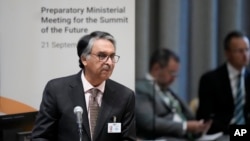Envoys of Pakistan and Iran will return to their posts by the end of this week, Pakistan and Iran announced Monday.
The latest sign of de-escalation comes almost a week after Iran struck alleged terror targets inside Pakistan and Islamabad responded with counterstrikes against purported terror hideouts across the border. The strikes killed at least 11 civilians, 9 in Iran and 2 in Pakistan.
Amid unprecedented tensions Islamabad recalled its ambassador from Tehran last Wednesday and told the Iranian envoy, who was on a trip to his home country, to not return. Islamabad also suspended all high-level visits between the two countries.
Monday’s press release, issued jointly by the foreign ministries of both the countries, said Iran’s Foreign Minister Hossein Amir Abdollahian will visit Pakistan on January 29 at his Pakistani counterpart Jalil Abbas Jilani’s invitation.
In a phone call Friday, the top diplomats of both countries agreed to defuse tensions and reestablish full diplomatic ties.
Analysts VOA spoke to say that while smoothing over ruffled ties is necessary and welcome, Iran’s unprovoked attack on Pakistan may have opened a Pandora’s box in the region.
Messaging tool
Iran has said it was targeting Sunni separatist group Jaish al-Adl’s hideouts on Pakistani soil.
Anti-state insurgents targeting Pakistan and Iran have been active along the 900-kilometer border between the two countries for years. They frequently mount deadly attacks against security forces.
The terrorist threat in the region has also expanded with hardline Sunni terrorist group Islamic State or IS targeting Shiite Muslims in both countries. The group claimed responsibility for twin blasts at an event near the tomb of Islamic Revolutionary Guard Corps General Qassem Soleimani on January 3. The blasts in southeastern Iranian city of Kerman killed more than 100 people.
While Pakistan acknowledges the IS presence in the country, the group has a bigger, highly organized structure in Afghanistan.
Washington-based security affairs expert Kamran Bokhari told VOA Iran's strikes were not necessarily a response to rising terrorism but meant to send a message to Washington in the context of the bloody Israel-Hamas war that has killed thousands in Gaza.
Since the war started last October, Washington has targeted Iranian proxies in the Middle East and the Red Sea while Tehran has struck U.S. forces in Iraq and Syria several times.
“They [militant hideouts in Pakistan] provided an excuse for Iran to do something different, which is basically to telegraph to the United States that look, we know that you are talking about a direct confrontation with us…. But, if you do that, then we have the capability to further expand this war,” said Bokhari who serves as a senior director of Eurasian security and prosperity at the Newlines Institute.
Bokhari believes Tehran picked Pakistan, as it’s a U.S. ally but mired in economic, political and security crises, and therefore, less likely to engage in a massive confrontation.
Pakistan’s counterstrike marked the first time Iran faced a direct attack since the Iran-Iraq war ended in 1988.
While the Biden administration condemned the Iranian action, Bokhari thinks those in Washington who favor a direct confrontation with Tehran may say, “We've never struck on Iranian soil. Now that the Pakistanis have done it, it sets a precedent.”
Islamabad-based security affairs expert Syed Muhammad Ali told VOA that while Pakistan and Iran managed to de-escalate quickly, any other country contemplating to attack Iran should not expect the same outcome.
“Even if it gives some ideas to some other countries, I think, they will have to factor in Iranian possible response options based on their own bilateral history and geostrategic convergences or divergences,” Ali said.
Pressure tool
While Tehran and Islamabad work to normalize ties, some are concerned sectarian groups may be exploited as a pressure tool.
Pakistan has a history of sectarian violence as Saudi-funded Sunni and Iran-funded Shiite armed groups came head-to-head in the 90s. Targeted killings on sectarian basis still occur.
On Sunday Pakistani officials claimed apprehending a “terrorist trained by a foreign country.” Authorities said he was getting support from a “neighboring country” and linked him to Zainabiyoun Brigade, an Iranian-backed militia.
“Pakistan is, both, being cautious not naming Iran, but also talking about perpetrators that may be linked with Iran,” said Ayesha Siddiqa, a military affairs expert and senior fellow at King’s College London.
Siddiqa said Pakistan and Iran have no choice but to continue to de-escalate tensions to avoid possible sectarian strife.
Shrinking space for militants
On Monday Pakistan armed forces’ media wing announced the military killed seven “terrorists” in an operation near the Pakistan-Afghanistan border in Baluchistan. The statement did not specify which outfit the slain militants were from.
In Pakistan’s counterstrike across the Iranian border, Islamabad claimed killing Baloch insurgents.
Ali told VOA he believes the space for anti-state actors that target Iran and Pakistan might shrink after last week’s events.
However, he said military operations are only a part of Pakistan’s multi-layered counterinsurgency strategy — that also relies on other incentives to encourage separatists to lay down arms.




